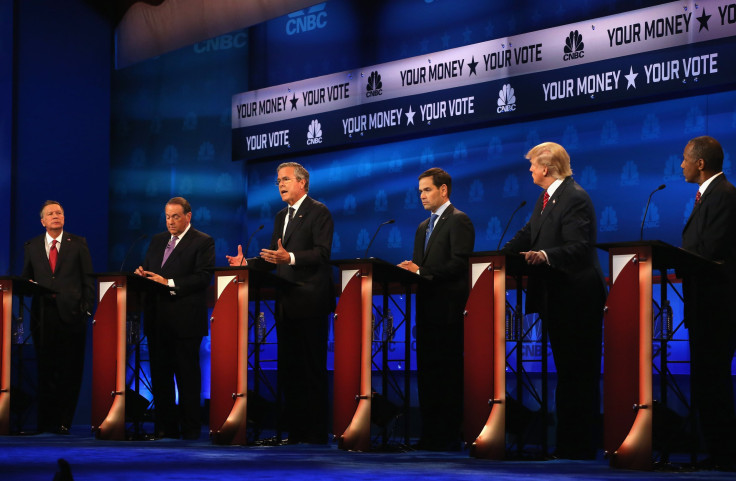GOP 2016 Candidates Debate Budget Deal As Rand Paul Announces Filibuster Ahead Of Senate Vote

Kentucky Sen. Rand Paul used his time on the national stage Wednesday night to promote his upcoming filibuster on the debt ceiling bill. Paul, polling 9th among the 15 candidates in the Republican race for the presidency, said he was worried about "bankrupting the American people" -- not keeping the government open.
The House passed a bill 266 to 167 Wednesday that would up federal spending by roughly $80 billion and stretch the Treasury Department's borrowing authority through March 2017, USA Today reported. When a CNBC moderator at the third GOP debate asked Paul whether he opposed the deal because it didn't cut enough from entitlement programs like Medicare and Social Security, he had a response ready.
"No, I oppose it because you're taking money from entitlement and then spending it immediately on other items," Paul said, mentioning military and domestic programs by name. "When you look at raising the debt limit, it should be leveraged to try to reform government."
Politico reported Paul can't actually filibuster due to a procedural issue. But he wasn't the only candidate to speak out on the bill, which he also said "will explode the deficit" and allow President Barack Obama "to borrow unlimited amounts of money." Ohio Gov. John Kasich said the United States can't balance its budget with "empty promises" and must be "creative and imaginative."
Wow Rand is announcing his filibuster of the budget deal from the Pres. debate. #gop
— Dwight Roberts (@dwightrobertsjr) October 29, 2015
New Jersey Gov. Chris Christie jumped in to say that about 70 percent of federal spending was on entitlements, and the problem was getting worse. "The government has lied to you and they have stolen from you. They told you that your Social Security money is in a trust fund," he said. "All that's in that trust fund is a pile of IOUs for money they spent on something else a long time ago."
Former Arkansas Gov. Mike Huckabee was more blunt, saying that the bill taking $150 billion from Social Security to borrow more was "like a 400-pound man saying, 'I'm going on a diet, but I'm eating a sack of Krispy Kremes before I do.'" Texas Sen. Ted Cruz supported Christie and Huckabee's positions.
In the undercard debate, former New York Gov. George Pataki backed the bill. "This is a bad deal, but to protect our military I would have signed it," he said. "I have a chance to lead this country, we're going to reduce the deficit, shrink the government, lower the tax burden and grow the private sector because that's how you solve deficits."
South Carolina Sen. Lindsey Graham also defended the deal, saying that the government's goal was to keep the nation safe. “This budget, if it is paid for, will put $40 billion back into the Defense Department at a time we need it," he added.
Meanwhile, Louisiana Gov. Bobby Jindal refused to say whether he'd rather the government shut down or pass the deal, calling it "a false choice." "Whenever they tell us in D.C. they're going to cut tomorrow, that means they're never going to cut. Tomorrow never seems to happen," he said. "Instead, why don't we actually follow our conservative principles? Why not insist on structural reforms? Why not cut spending?"
© Copyright IBTimes 2024. All rights reserved.






















